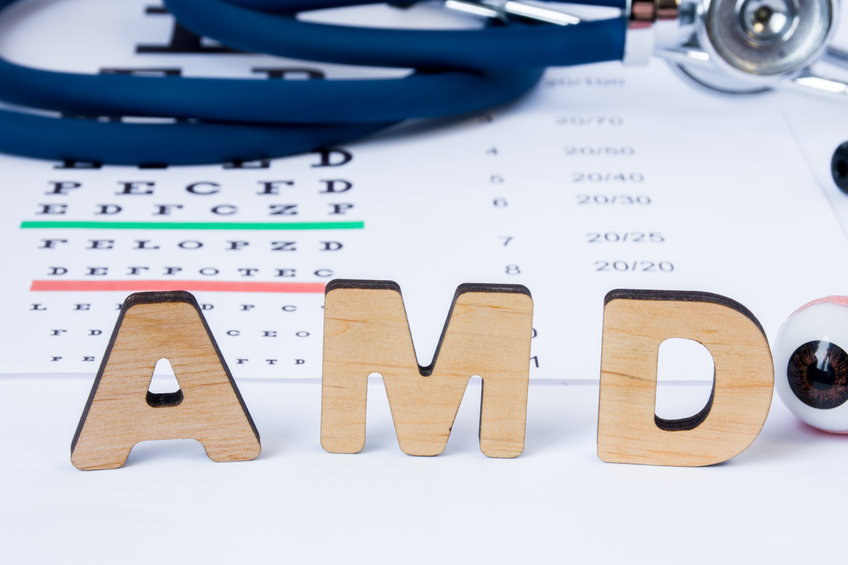Age-Related Macular Degeneration (AMD) is a leading cause of irreversible blindness worldwide, and affects nearly 30% of people over the age of 75 to some degree. The macula is responsible for our center vision, allowing us to see fine details, and is the area we use to read or look at someone’s face. When this area degenerates, it becomes more difficult for people to identify objects in this central portion of their vision. Macular degeneration is commonly referred to as “dry” or “wet”, each with their own features, risks, and treatment options.
Macular degeneration occurs when there’s an imbalance in the eye’s ability to deal with waste products at the macula. This change can be due to age, lifestyle, and genetics. The macula is a very active part of the eye and requires many key nutrients to function properly. Due to its high demand for energy and nutrients, it also creates a significant amount of cellular waste. Over time, our body’s natural ability to get rid of these waste products declines, leading to a build-up of cellular waste products at the macula. These deposits are known as “drusen”. As drusen accumulate at and around the macula, it further impairs the ability for proper nutrient exchange, leading to structural and functional degeneration. These changes can be perceived as blurry or dark spots in a person’s vision. If the drusen are large enough to change the shape of the macula, straight lines can appear blurry and fine print can become distorted. This form of AMD is referred to as “dry” and is the most common type. In some cases, dry AMD can progress enough to severely limit vision, but usually does not significantly impact a person’s quality of life.
When dry AMD progresses, the body can try to bring more nutrients to the macula by way of new blood vessels. The vessels produced in diseases like AMD are not as sturdy as our normal vessels, and are prone to leaking blood and other materials. This process changes the classification of AMD from “dry” to “wet”. Leaky vessels can cause drastic changes in the macula and surrounding structures such as swelling and scarring. Wet macular degeneration is much more visually significant and can have devastating effects on vision if not promptly treated.
Read our blog about Dry Eye disease by Dr. Dugan
Treatment for dry AMD involves the use of over-the-counter eye vitamins such as Preservision. Preservision contains a clinically studied combination of ingredients that have been shown to slow the progression of drusen accumulation in people with moderate to advanced AMD. This combination of vitamins is referred to as AREDS, an acronym for the Age-Related-Eye-Disease-Study it was founded on. The original AREDS formula was slightly reformulated during a second study, the newest formulation is now called AREDS 2. There are several other eye vitamins on the market for AMD, however, I recommend only using an eye vitamin that contains the AREDS 2 formula. Before starting any new supplement, it is important to talk to your doctor to ensure it doesn’t interact with your other mediations or personal health history. If a person’s AMD progresses to wet, the AREDS vitamins are okay to continue, but additional treatment is required. Treatment for wet AMD involves injecting medicine into the eye to combat the growth of new blood vessels.
Other ways to protect your eyes from developing AMD include wearing sunglasses when you’re outside, eating darkly pigmented vegetables like spinach and broccoli, and not smoking. The eyes are an extension of the body, and often, if we take care of our bodies, our eyes will follow suit. If you have concerns about your vision or risk of developing AMD, talk to your eye care provider at your next examination. For more information on AMD, see the links below.
Save up to 80% on the cost of your prescriptions at your local pharmacy with EasyDrugCard.com. Download your free drug card and begin saving today.
References:
https://www.aao.org/eye-health/diseases/amd-macular-degeneration












